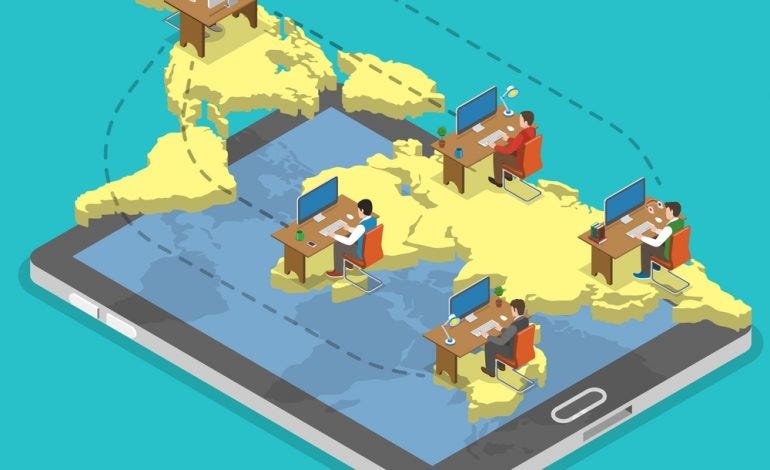Latest news about Bitcoin and all cryptocurrencies. Your daily crypto news habit.

This question often comes to my mind: will technologies make offices obsolete. The answer seems affirmative if one goes by current trends. We’re not talking about small, home-based businesses and startups struggling to meet operational expenses. Instead, this is about large corporations that are moving away from the traditional requirement for employees to report to an office daily.
Facts and figures available from various sources only confirm my assertion that technologies will make offices obsolete. In fact, it is already doing so.
Facts and Figures
These facts and figures conclusively prove, technologies are making offices obsolete- at least partly at the moment.
- Over 70 percent of workers worldwide work from home at least once a week says a 2018 study by IWC, a leading office space provider.
- About 57.3 million Americans work from home as freelancers. Among these, 47 percent are millennial.
- Gig economy contributes over $1.4 trillion to the American economy since 2017.
- Large corporations including American Express, Amazon, Dell, Apple and Glassdoor.com among others are increasingly allowing existing and new employees to work from home.
- Rising real estate prices are forcing even large corporations to reconsider hiring office space. Instead, they are offering work-from-home opportunities.
These five pointers indicate that offices are indeed going obsolete while technology increasingly drives this trend.
However, this isn’t all. There are other reasons too why technologies will make offices redundant.
Tech and Higher Productivity
Higher productivity from employees is the greatest deciding factor for companies to hire telecommute or remote workers. Higher productivity combined with better job satisfaction levels and healthier lifestyles among employees is one of the advantages that companies derive by allowing people to work. Studies amply prove this fact.
Furthermore, remote workers also earn about $7,000 to $10,000 more than traditional office workers. Because they get more productivity linked bonuses and other incentives. Additionally, remote workers also enjoy happier family life- something that every employee seeks.
Remote working itself is made possible due to advances in Internet technology: it enables flexible work hours.
Cloud Computing
Migrating operations to cloud technologies is an excellent example of how technologies are making offices obsolete.
Earlier, accommodating servers and their support infrastructure was a headache for most companies. The main reason- they are expensive to maintain, prone to frequent crashes for various reasons and need a lot of support infrastructure like air conditioning. Enter cloud technology, and servers are fast going extinct.
Cloud computing enables employees located anywhere in the world to access their employer for any business. And cloud software costs much lower than servers and maintenance. Usually, cloud software developers will provide the necessary updates either free or through subscription. Some companies claim, they save over 15 percent of operational costs by after switching to cloud-based platforms.
Blockchain
For some years, Blockchain was a less understood technology. Its main purpose was for dealing in crypto-currencies including Bitcoin. Over the years, this scenario is changing. Banks and other organizations now eye Blockchain as an effective solution to meet growing demands for faster transactions and business deals.
Advances in Blockchain technology and its adoption by financial corporations are creating remote jobs worldwide. Blockchain and its processes are easily accessible in most parts of the world. As corporations increasingly adopt Blockchain, we would see traditional offices become obsolete.
Remote Work Apps
Workplace by Facebook, TeamViewer, Microsoft Remote are just some apps that enable remote work using smartphones. Some are available free while others are on subscription only. They cost a mere fraction of what it takes to set up an entire, fully equipped office. These apps enable companies to keep track of employee performance while enabling collaboration between remote workers.
Simultaneously, there are corresponding advances in mobile technology too. We already have high-speed Fifth Generation (5G) and Fourth Generation (4G) mobile Internet in some parts of the world.
Smartphone manufacturers, including those using Android platforms and Apple, are upgrading devices to match advances in mobile technologies. This translates as more flexibility for remote workers to work while on the move. And it spells impending doom for traditional offices.
Internet of Things (IoT)
Over 20 million Internet of Things (IoT) devices are projected to be in use worldwide by 2020 says the World Economic Forum. Not without reason. IoT is steadily entering homes in the form of smart refrigerators, air conditioners, and other appliances. By the same corollary, IoT is making steady headway in the corporate world too.
IoT is one of the keys that enables work-from-home or remote work. It allows telecommuters to connect with their offices, regardless of time and location. In return, this translates into better productivity and higher profits. In stark contrast, traditional offices fare poorly: they operate during fixed hours and require expensive staff and infrastructure.
Conclusion
These facts indicate technologies will make offices obsolete. Remote work combined with technologies enables businesses of all sizes to hire workers with much-desired skills anywhere in the world. Also, it will eradicate geographical frontiers. And we will see more new technologies that make offices redundant, emerge over the coming years.
Could Technology Make Offices Obsolete? was originally published in Hacker Noon on Medium, where people are continuing the conversation by highlighting and responding to this story.
Disclaimer
The views and opinions expressed in this article are solely those of the authors and do not reflect the views of Bitcoin Insider. Every investment and trading move involves risk - this is especially true for cryptocurrencies given their volatility. We strongly advise our readers to conduct their own research when making a decision.



